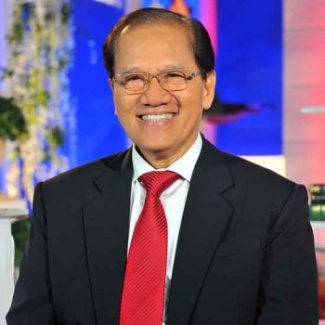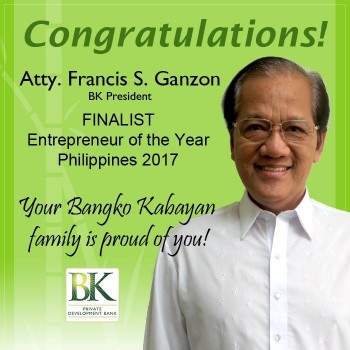 It is currently one of the biggest rural banks of the Philippines. But when Francis Ganzon (67 years old) took the helm in 1989, it only had one branch. Since then, the Institute has engaged in the support and empowering of the small and medium enterprises (SME), through the offer of quality financial systems “with a workforce united with God,” as the Bank site describes its “mission”. After obtaining his law degree, Ganzon dedicated himself to saving an institute, the Ibaan Rural Bank, Inc. (IRB), which was involved in cases of fraud. “I promoted a different work style, focusing on compliance with the laws, professionalism and centrality of the people, and promoted new practices in line with Christian values.” Ganzon embraced the spirit of the Economy of Communion, the international network of entrepreneurs engaged in putting the Social Doctrine of the Church into practice. “Subsequently, we created the Ibaan Rural Bank Foundation, with the objective of extending the microcredit programme also to deserving students with economic difficulties, through scholarships. The Asian financial crisis of 1997 also struck our bank, but we did not close down also thanks to the trust of our clients. That same year, the Bank celebrated its 40th Anniversary, and we changed its name to Bangko Kabayan (fraternity bank) as a further effort to supply people in need with the possibility to access microcredits in order to elevate their own standard of living.”
It is currently one of the biggest rural banks of the Philippines. But when Francis Ganzon (67 years old) took the helm in 1989, it only had one branch. Since then, the Institute has engaged in the support and empowering of the small and medium enterprises (SME), through the offer of quality financial systems “with a workforce united with God,” as the Bank site describes its “mission”. After obtaining his law degree, Ganzon dedicated himself to saving an institute, the Ibaan Rural Bank, Inc. (IRB), which was involved in cases of fraud. “I promoted a different work style, focusing on compliance with the laws, professionalism and centrality of the people, and promoted new practices in line with Christian values.” Ganzon embraced the spirit of the Economy of Communion, the international network of entrepreneurs engaged in putting the Social Doctrine of the Church into practice. “Subsequently, we created the Ibaan Rural Bank Foundation, with the objective of extending the microcredit programme also to deserving students with economic difficulties, through scholarships. The Asian financial crisis of 1997 also struck our bank, but we did not close down also thanks to the trust of our clients. That same year, the Bank celebrated its 40th Anniversary, and we changed its name to Bangko Kabayan (fraternity bank) as a further effort to supply people in need with the possibility to access microcredits in order to elevate their own standard of living.”  “Many clients – continued Ganzon – did not have collaterals, but we considered them as worthy people. This created a rapport of mutual trust: the bank trusted people and granted loans, and the clients trusted the bank. In this way Bangko Kabayan had a strong social impact, improving the lives of many people and many small enterprises. Then it became the preferred credit provider of the SME in our region, opening 23 branches in the provinces of Batangas, Quezon and Laguna.” In the near future, Bangko Kabayan will be committed to building a balanced portfolio of loans and capital, and in investing further in the new technologies, particularly in internet banking. Up to now Bangko Kabayan has been receiving various awards. In 2007, it received the best Capital Build-up in the PremiLandbank and was ranked among the best credit institutes at global level for microcredit. From 2008 to 2011 and again in 2013 and 2015, it was nominated in the region where it has its main office, a partner of the Land Bank of the Philippines. It moreover received Microenterprise access to the MF EAGLE award for bank service from 2003 to 2007 and again in 2010 and 2011. «Determination and integrity will always be compensated,” concluded Ganzon. “I am anxiously waiting for the day in which bank transactions can be done with a handshake instead of on paper.”
“Many clients – continued Ganzon – did not have collaterals, but we considered them as worthy people. This created a rapport of mutual trust: the bank trusted people and granted loans, and the clients trusted the bank. In this way Bangko Kabayan had a strong social impact, improving the lives of many people and many small enterprises. Then it became the preferred credit provider of the SME in our region, opening 23 branches in the provinces of Batangas, Quezon and Laguna.” In the near future, Bangko Kabayan will be committed to building a balanced portfolio of loans and capital, and in investing further in the new technologies, particularly in internet banking. Up to now Bangko Kabayan has been receiving various awards. In 2007, it received the best Capital Build-up in the PremiLandbank and was ranked among the best credit institutes at global level for microcredit. From 2008 to 2011 and again in 2013 and 2015, it was nominated in the region where it has its main office, a partner of the Land Bank of the Philippines. It moreover received Microenterprise access to the MF EAGLE award for bank service from 2003 to 2007 and again in 2010 and 2011. «Determination and integrity will always be compensated,” concluded Ganzon. “I am anxiously waiting for the day in which bank transactions can be done with a handshake instead of on paper.”
Don’t be indifferent to poverty
Don’t be indifferent to poverty




0 Comments